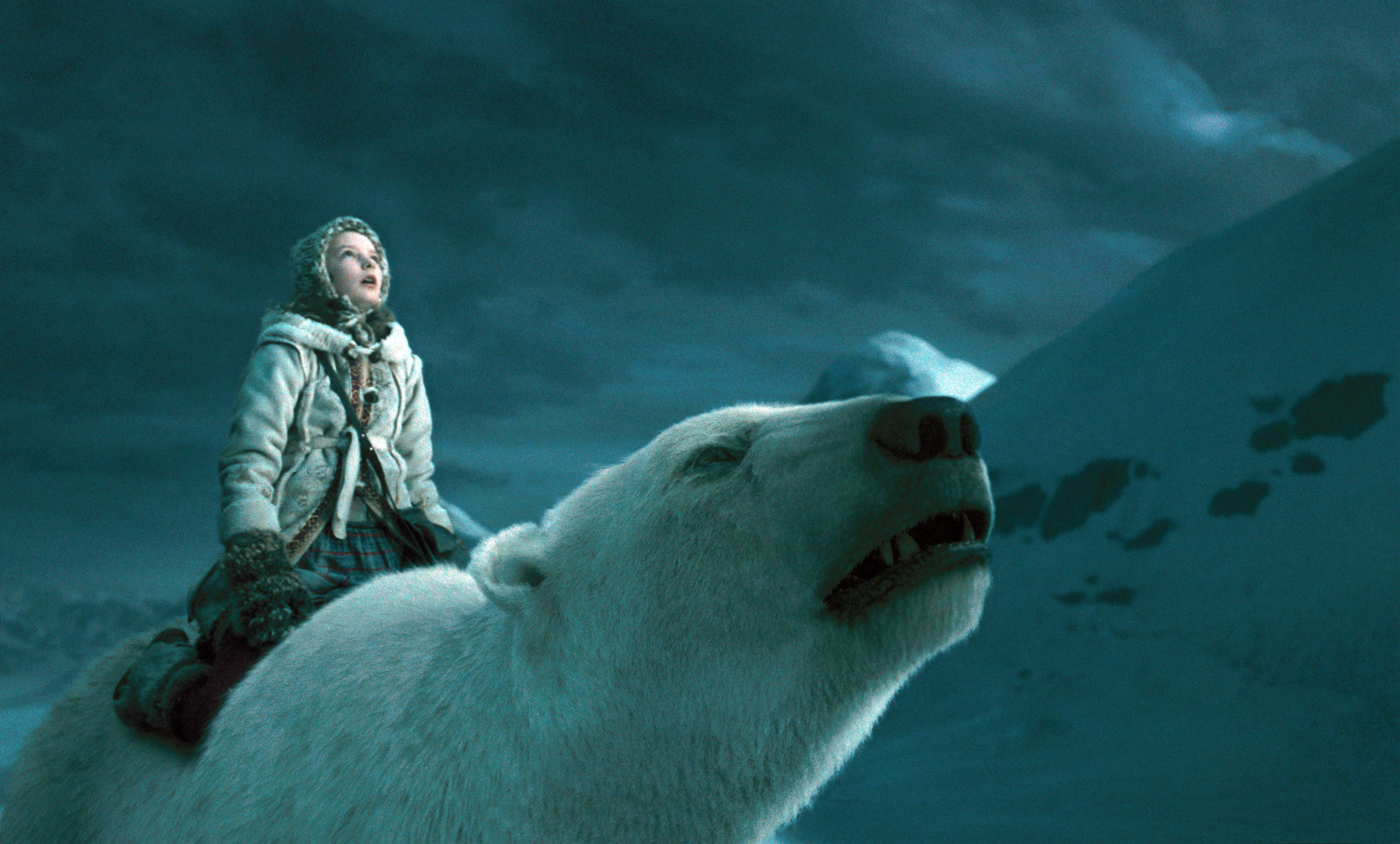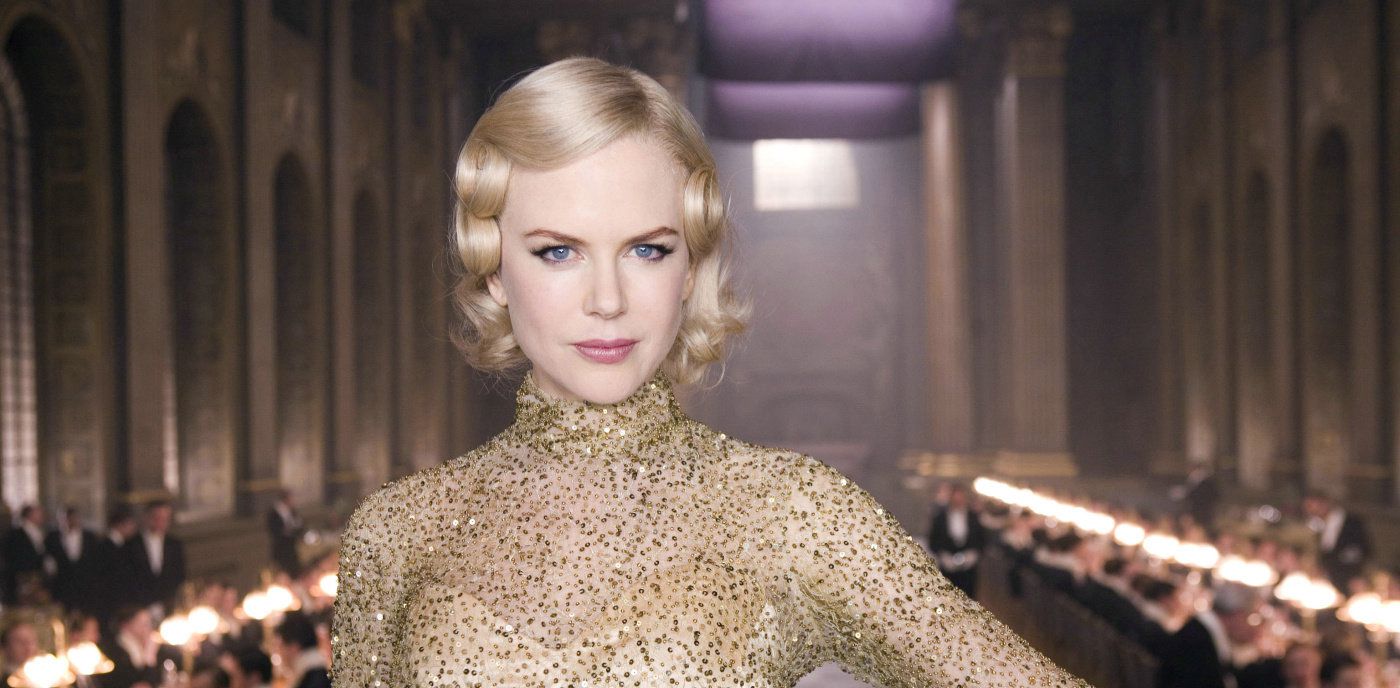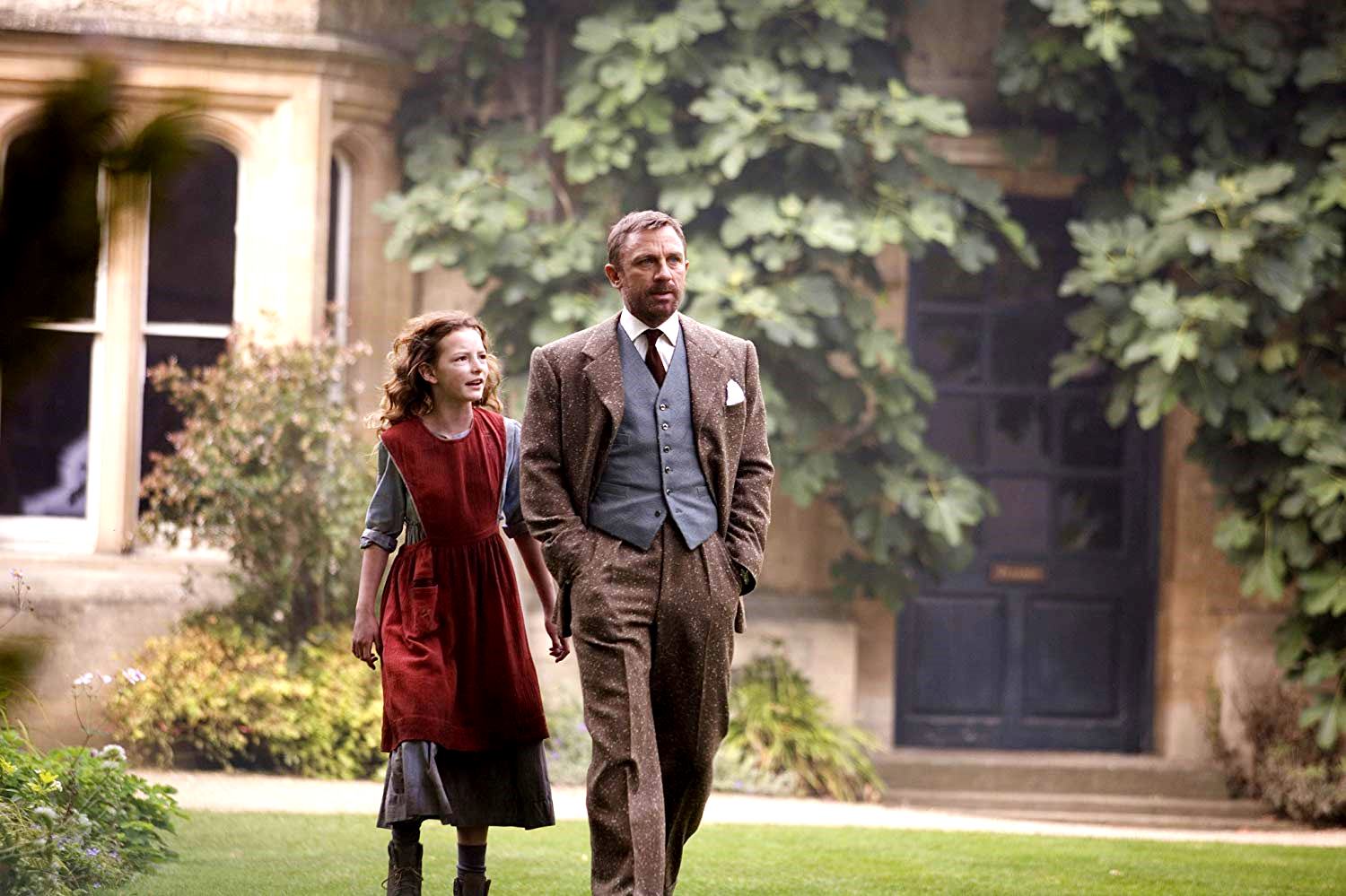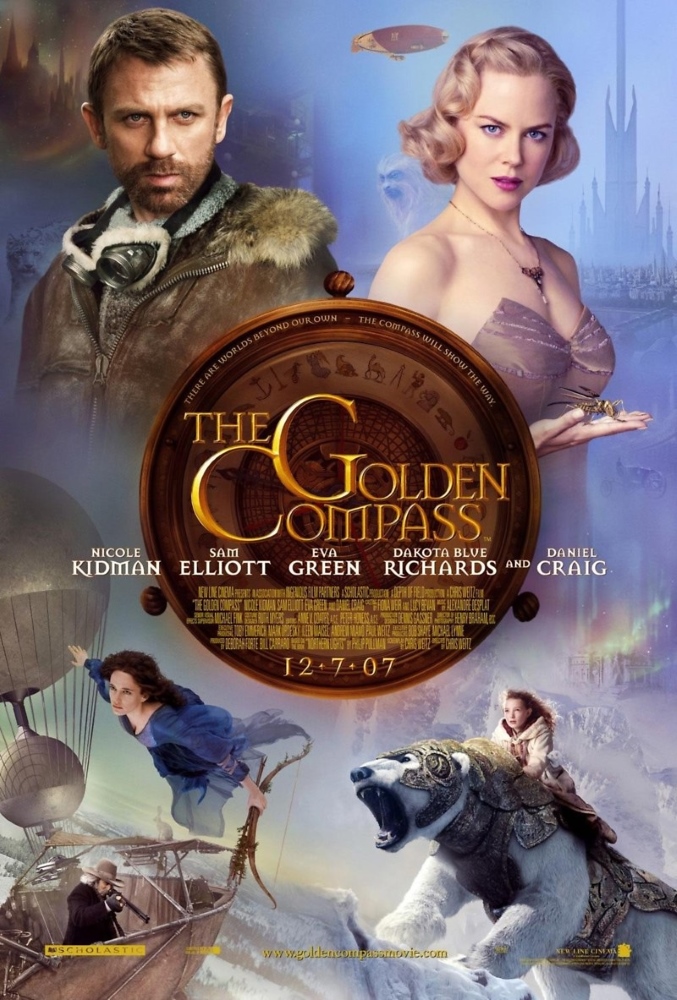USA. 2007.
Crew
Director/Screenplay – Chris Weitz, Based on the Novel Northern Lights (1995) by Philip Pullman, Producers – Bill Carraro & Deborah Forte, Photography – Henry Braham, Music – Alexandre Desplat, Senior Visual Effects Supervisor – Michael Fink, Visual Effects – Cinesite (Europe) (Supervisors – Matt Johnson & Sue Rowe), Digital Backlot (Supervisor – Craig Barron), Digital Domain (Supervisor – Bryan Grill), Framestore CFC (Supervisor – Ben Morris), Matte World Digital, Peerless (Supervisor – Kent Houston), Rainmaker (Supervisor – Paddy Eason), Rhythm & Hues (Supervisor – Bill Westenhofer) & Tippett Studio, Special Effects Supervisor – Trevor Wood, Daemon Maquettes – Neal Scanlan Studios (Supervisor – Neal Scanlan), Production Design – Dennis Gassner. Production Company – New Line Cinema/Ingenious Film Partners/Scholastic Productions/Depth of Field Productions.
Cast
Dakota Blue Richards (Lyra Belacqua), Nicole Kidman (Marisa Coulter), Daniel Craig (Lord Asriel), Sam Elliott (Lee Scoresby), Eva Green (Serafina Pekkala), Ben Walker (Roger Parslow), Jim Carter (Lord John Faa), Tom Courtenay (Farder Coram), Simon McBurney (Fra Pavel), Charlie Rowe (Billy Costa), Derek Jacobi (Magisterial Emissary), Clare Higgins (Ma Costa), Jack Shepherd (Master), Magda Szubanski (Mrs Lonsdale), Christopher Lee (First High Councillor)
Voices
Ian McKellen (Iorek Byrnison), Freddie Highmore (Pantalaimon), Ian McShane (Ragnar Sturlusson), Kristin Scott Thomas (Stelmaria), Kathy Bates (Hester)
Plot
There are many different universes – in some of these, people have souls inside their bodies; in this one, people have daemons – souls that live outside their bodies and take the form of animals. Young orphan Lyra Belacqua has been placed at Jordan College in the care of her uncle Lord Asriel. Asriel seeks funding for an expedition to the North Pole to explore a source of the mysterious substance known as Dust that is filtering through from other universes. Lyra accidentally observes a member of The Magisterium – the church that rules the world with an iron hand – trying to poison the wine at Asriel’s presentation but warns her uncle in time. Mrs Coulter then arrives to take Lyra away. Before she goes, the elders of the college present Lyra with an alethiometer – the only one left in existence – a compass that always points to the truth. After departing, Lyra realises that Mrs Coulter is in charge of the mysterious Gobblers who have been abducting children. Lyra flees and falls in with a company that includes the boat-dwelling Gyptians, the aeronaut Lee Scoresby, the talking ice bear Iorek Byrnison and the witch Serafina Pekkala. They head north on a journey to the frozen land of Svalbard in search of the laboratory of Bolvangar where Mrs Coulter is overseeing experiments to separate children from their daemons as part of The Magisterium’s attempts to further exert their control over people.
Ever since the massive success of Peter Jackson’s Lord of the Rings trilogy – The Lord of the Rings: The Fellowship of the Ring (2001), The Lord of the Rings: The Two Towers (2002) and The Lord of the Rings: The Return of the King (2003) – fantasy has become big box-office business. We have had a number of films trying to copy the Tolkien-esque epic fantasy to varying degrees of success. The smart producers among these have hit on the idea of searching for works that are likely to spin off franchises a la The Lord of the Rings. This is apt in that in publishing, from which most of these films draw their sources, epic fantasy tends to get sold in terms of ongoing sagas and multi-part stories as opposed to single self-contained novels.
With everyone trying to come up with “the next Lord of the Rings“, The Golden Compass seemed to be 2007’s Lord of the Rings wouldbe. It was certainly one of the more concerted efforts to jump aboard the fantasy box-office bandwagon. For one, it came from New Line Cinema, the studio that started the fantasy fad off by betting just about everything they had on Peter Jackson and J.R.R. Tolkien. The promotion for The Golden Compass was not slow in exploiting the New Line/Lord of the Rings connection – the trailer for The Golden Compass even started with the image of the One Ring transforming into the alethiometer. More than that, the film also casts two of the core actors from The Lord of the Rings – Ian McKellen who voices the ice bear Iorek Byrnison and Christopher Lee who turns up in the background for all of one scene as a member of the Magisterium council.
For their source material, New Line Cinema turn to the His Dark Materials trilogy by Philip Pullman. The His Dark Materials books consist of Northern Lights (1995), which was retitled The Golden Compass in the US, The Subtle Knife (1997) and The Amber Spyglass (2000), with Pullman having promised further works set in the same multiverse, which came about with the The Book of Dust trilogy that began with La Belle Sauvage (2017). (The title His Dark Materials is taken from a phrase in John Milton’s famous poem Paradise Lost (1667) about Satan’s rebellion against Heaven). Pullman’s books have been adapted to the screen before with the appealing tv movie I Was a Rat (2001) about a boy who realises he used to be one of the rats that was transformed into a footman by the fairy godmother in Cinderella. There was also The Ruby in the Smoke (2006) and The Shadow in the North (2007), two tv movies based on Pullman’s non-fantasy mystery series about a girl detective in Victorian England, and the non-genre film The Butterfly Tattoo (2008), a troubled teen romance.

The His Dark Materials books come mired in considerable controversy. Philip Pullman has been described as the anti-C.S. Lewis – where Lewis wrote the Narnia books as allegories for Christian faith, Philip Pullman by contrast is an outspoken atheist and this is reflected in the His Dark Materials books. Certainly, a good deal of this has been watered down when it comes to the film version of The Golden Compass – in the books, The Magisterium is the alternate world’s version of the Catholic Church who are revealed to be trying to control humanity and even physically eradicate parts of the personality. This becomes even more evident in the third book The Amber Spyglass where God is revealed to be a decrepit old fraud who is ignobly sent over a cliff to his death, while the afterlife is ventured into where it is found that the souls of the dead are kept imprisoned and tortured before being freed by Lyra and her companion Will to scatter and become part of the universe. The film has also watered down the concept of The Dust, which Pullman alikened to Original Sin. These elements have had many Christian conservatives seeking to have Philip Pullman’s books removed from shelves, although there have also been dissenting voices, including the Archbishop of Canterbury who spoke out in favour of the books. Pullman’s books have also ended up winning an impressive number of literary awards.
It is this atheist aspect of Philip Pullman’s books that attracted controversy on both sides of the fence before The Golden Compass even opened. The first controversy came from the fans of the books after there was the general announcement that reference to the Church would be excised to make the film more acceptable to the mainstream American audience. Then came The Catholic League’s denouncement of the film (without having even seen it) in a 25 page pamphlet urging that Catholics boycott the film. League spokesman Bill Donohue claimed that, though the church elements were watered down, the film acted as no more than a gateway for young minds to be dragged into the atheism of Philip Pullman’s books.
This does reveal one of the ugly things that has happened to modern fantasy cinema – that the genre has now become split along religious lines. Coincident with the rise of the new fantasy cinema has been a massive new mainstream audience for Christian-themed films, following the success of Mel Gibson’s The Passion of the Christ (2004). Fantasy has become very much a genre that is now either pro- or anti-Christian. Reading some of the Christian commentary on The Golden Compass reaches the near laughable – claims that because Pullman has called people’s souls daemons that he is trying to make demonic possession attractive, for instance. Elsewhere the Harry Potter books and films have been slammed for supposedly creating an interest in the occult. On the other hand, The Chronicles of Narnia: The Lion, The Witch and the Wardrobe (2005) came with a dual campaign that pitched the film as a Christian allegory to church audiences and another that sold it as a fantasy for mainstream audiences, while a Christian work like Bridge to Terabithia (2007) had a promotional campaigns that tried to misrepresent the story and sell it as an epic fantasy adventure.
The sad truth about Bill Donohue and cohorts is that they ironically reinforce the view that Philip Pullman holds of the church in the books – as an organisation that assumes that people are too stupid to be able to think for themselves and must have potential influences on what they think censored for them. Indeed, it is an outlook that tolerates no dissent with its own narrow ideological focus – one is caught either in the fascism of thinking as one is told to, while any choice that does not accept this orthodoxy is deemed heretical. For all the atheism and pantheism espoused by Philip Pullman and J.K. Rowling, one has yet to hear any comparable cries from atheist/agnostic quarters that The Lion, The Witch and the Wardrobe should be banned because it innocently draws young audiences in and seduces them towards an interest in Christianity.

One of the great surprises about The Golden Compass was that the director attached ended up being Chris Weitz who comes from a comedy rather than a fantasy background. Chris Weitz first appeared, almost always in conjunction with his older brother Paul, as co-writer of DreamWorks’ animated Antz (1998) and then gaining fame with the enormously successful American Pie (1999) directed by Paul. As a directing team, the Weitz’s subsequently went onto make Down to Earth (2001) and About a Boy (2002), as well as to co-write The Nutty Professor II: The Klumps (2000). None of this seems to demonstrate a penchant for anything other than mainstream comedy – indeed, Chris Weitz confessed in an interview that the most he had come to such an undertaking as The Golden Compass was a single effects shot for Down to Earth. He quit The Golden Compass at one point, believing the task was too massive but then signed back on a few months later after flying to New Zealand to receive a crash course in big-budget filmmaking and special effects technology from Peter Jackson during the shooting of King Kong (2005).
The Golden Compass is a film where New Line Cinema have spared no expense to make another Lord of the Rings, having thrown a budget of $180 million at it, nearly two-thirds of what they spent on the entire Lord of the Rings trilogy. Certainly, one of the finest aspects of The Golden Compass is the production design. Most fantasy films take place in a nether Middle Ages where technology seems to have been perpetually frozen at the point of swordcraft and armour-building. It is worth celebrating The Golden Compass as being about the only film in the current epic fantasy fad, aside from the contemporary-set Harry Potter films, to ditch the generic fantasy kingdom setting with its feudal lands, peaceful shires, looming castles and dark lords, robed wizards etc etc. The Golden Compass by contrast bumps the era up to an almost familiar alternate world version of England somewhere between the Victorian era and the 1920s. People travel about in magnificently designed airships and carriages that are drawn by magical energy, while the sets have a beautiful hand-constructed look.
New Line have assembled a big name cast, including Daniel Craig, the lovely and intelligent Eva Green, Sam Elliott (who goes through the aging old timer cowboy role he has for about the last 48 films he has appeared in) and Nicole Kidman. [Kidman joins one of the peculiar fads of 2007 that seemed to consist of A-list actresses making appearances as witches in fantasy films, along with Michelle Pfeiffer in Stardust (2007) and Angelina Jolie in Beowulf (2007)].
The problem with the adaptation is that much of the development on screen seems hurried and the characters and cultures in the background never get the time one would have liked them to. The middle of the film seems to whip characters – the Gyptians, Serafina Pekkala, Lee Scoresby – by with the blurred pace of a slide show. We are given an abrupt revelation about Nicole Kidman’s character in the last few minutes of the film, which leaves us uncertain whether we should regard her as a villainness or not. There is a fine cast present in these roles but the performances seem steam-rollered over in the film’s need to compact exposition to a bare minimum and rush onto the next scene. There also seem issues that needed to be further explained – it is not clear why The Magisterium wants the issue of Dust quashed, or for that matter why people regard Lyra Belacqua as prophesied.

The main problem I had with The Golden Compass was that I, and I would guarantee fairly much every member of the audience, wanted it to be this year’s The Lord of the Rings. The publicity campaign exploited the connection so much so that you could not help but go into the theatre expecting the same. The film is slow to start and you sit through the talky first half at least marvelling at the world that the design team have crafted. The film starts to soar when it gets to the magnificent creation of Iorek Byrnison – the one original and fully realised character in the film – and seeing him rampaging through the town to reclaim his armour. It is here that you think that The Golden Compass is belatedly starting to gain its feet. However, as we progress through the fights between the ice bears, the incursion into Bolvangar and the climactic battle scenes, you realise that beautifully put together and all that The Golden Compass is, it just isn’t another Lord of the Rings. The climactic battle scenes are big-scale but fail to soar with the heights that the Battle of Helm’s Deep in The Two Towers did.
Though the Vatican self-righteously gloated over the fact that people did not go to see The Golden Compass and seemed convinced that the reason for this was because they were god-fearing citizens, the real reason one expects might simply be because The Golden Compass fails to soar as people want it to. You feel that somewhere between Chris Weitz’s determination to put the story on screen with a reasonable degree of faithfulness and his lack of experience with the epic adventure, the elements present never gel cinematically.
The problem with this is also one of epic fantasy on the big screen vs epic fantasy on the printed page. Most fantasy is published as multi-volume works. On screen, at $180 million a pop, such multi-volume fantasy is a massive and risky undertaking. The gamble that New Line Cinema took with The Golden Compass was that it would be popular enough that Philip Pullman’s other books could then be made. To this extent, the end of the film has been left open as the characters head off towards a massive war that is about to happen. Most of the characters feel like they have dramatic arcs that are still to find their peak – the film ends with the feeling that a Fellowship has been built but where we are waiting for the real adventure to begin.
Alas, with the lack of box-office success that The Golden Compass enjoyed – earning only $26.1 million in its opening weekend in the US – it seems doubtful whether The Subtle Knife will see cinema screens. (Indeed, with The Golden Compass only recouping a third of what it cost to make at the box-office, the result ended up putting New Line Cinema into bankruptcy). What we end up with is not the first in a multi-film franchise but rather a one-off film that feels incomplete in its storytelling.
More recently, the BBC remade the books into the tv series His Dark Materials (2019-22).
Chris Weitz next went onto direct the Stephanie Meyer adaptation New Moon/Twilight Saga: New Moon (2009), followed by the non-genre illegal immigrant drama A Better Life (2011), Operation Finale (2018) about the hunt for Adolf Eichmann and the AI horror Afraid (2024). He also wrote the screenplays for Cinderella (2015), Rogue One (2016), The Mountain Between Us (2017), Pinocchio (2022) and The Creator (2023). He has also produced the SF film Prospect (2018), the space shuttle romantic comedy If You Were the Last (2023) and the tv series Murderbot (2025- ).
(Winner for Best Production Design, Nominee for Best Special Effects at this site’s Best of 2007 Awards).
Trailer here


